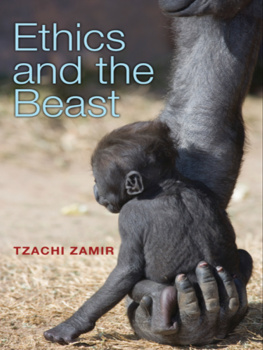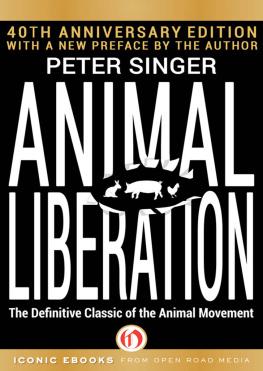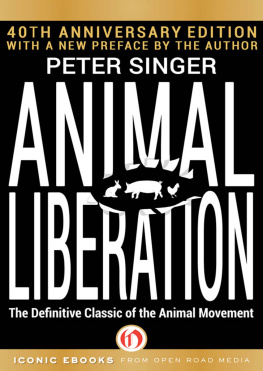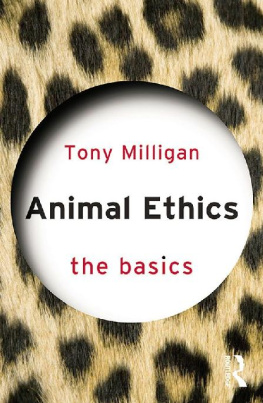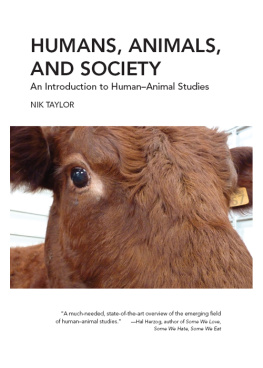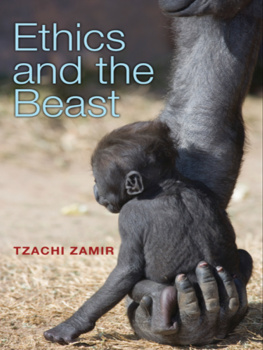Ethics and the Beast
Ethics and the Beast
A SPECIESIST ARGUMENT FOR
ANIMAL LIBERATION
Tzachi Zamir
P R I N C E T O N U N I V E RS I T Y P R E S S
P R I N C E TO N A N D OX F O R D
Copyright 2007 by Princeton University Press
Published by Princeton University Press, 41 William Street,
Princeton, New Jersey 08540
In the United Kingdom: Princeton University Press, 3 Market Place,
Woodstock, Oxfordshire OX20 1SY
All Rights Reserved
Library of Congress Cataloging-in-Publication Data
Zamir, Tzachi, 1967
Ethics and the beast : a speciesist argument for animal liberation / Tzachi Zamir.
p. cm.
eISBN: 978-1-40082-813-5
1. Animal welfareMoral and ethical aspects. 2. Speciesism. I. Title.
HV4708.Z36 2007
179'.3dc22
2007007155
British Library Cataloging-in-Publication Data is available
This book has been composed in Sabon
Printed on acid-free paper.
press.princeton.edu
Printed in the United States of America
1 3 5 7 9 10 8 6 4 2
Dedicated to Iddo Landau and Daniel Statman
ACKNOWLEDGMENTS
THIS BOOK BEGAN from a series of arguments over several lunches with Richard Posner of the University of Chicago, who challenged me to defend my moral vegetarianism. I did not fair well, and so I began to sketch an argument that eventually developed into this book. I thank him for prompting me to take up animal ethics seriously.
For comments on individual chapters, I am indebted to Shuli Barzilai, Stan Godlovitch, Nathan Nobis, Tom Regan, Nahum Shpiegel, Alon Wasserman, and Eddy Zemach. Godlovitch and Zemach have significantly influenced and challenged my thoughts at several important stages, and I am grateful to both for discussing drafts with me. I am also obliged to Horst Spielmann, head of ZEBET, for a generous invitation to the 5th World Congress on Alternatives and Animal Use in the Life Sciences (Berlin, 2005). Some of the alternative-related information presented in the fourth chapter was obtained in that conference.
Substantial comments on the manuscript as a whole were provided by the three reviewers of the book. I would like to thank Peter Singer and the two anonymous reviewers for the wise, constructive, and generous comments that they made.
I cannot assess the degree to which my thoughts on animals have been influenced by my wife, Orit. I feel sure that her being a veterinarian, more than enabling me to repeatedly verify points of fact when writing this, has enveloped me for many years in the concerns and moral dilemmas that hands-on work with animals involves. Her moral vegetarianism preceded mine, and I am certain that her example has led to my own decisions. I am grateful for both her help and her influence.
Iddo Landau and Daniel Statman have both provided valuable comments on chapters in this book. But they have also enabled it in a very real sense by courageously supporting me in complex circumstances. Their inspiring attitude exemplifies, for me, moral integrity under pressure. I dedicate this book to them.
Some of the chapters have been published in earlier forms as journal articles. Chapter 1 was published in Philosophia. Chapters 2 and 3 were published in Between the Species; chapter 4 in the Journal of AppliedPhilosophy; chapter 6 in the Journal of Social Philosophy; and chapters 7 and 8 in Society and Animals. I thank these journals for permission to modify and incorporate this material here.
INTRODUCTION
SPECIESIST-LIBERATIONISM seems a contradiction in terms. Yet this book offers an elaboration of precisely this position, presenting it as the one that liberationists and nonliberationists should endorse. Calling this a defense of speciesist liberationism would somewhat misrepresent the books argument, since I avoid showing why speciesism is itself justified. My concern is, rather, to show how a detailed case for reforming our attitude toward nonhuman animals need not involve abandoning widely shared speciesist intuitions. Deradicalization of the theoretical underpinnings of liberationism is important not merely because it is philosophically correct, or because it trims the debate over animal ethics of surplus detailed arguments. The more significant benefit of a theoretical minimization of the case for reform is tapping a broader consensus. Weighty practical ramifications follow from conservative, widely shared, moral beliefs.
The books first two chapters rework the more abstract considerations underlying liberationism. I begin by showing that speciesism contradicts liberationism only under an overly strong and unintuitive rendering of the term. After claiming that liberationism is continuous with virtually all of our speciesist intuitions, the next chapter pinpoints another unfortunate detour that currently burdens reform: the case for the moral status of animals. The chapter aims to rid liberationism of the need to establish such status. After rewriting the case for reform, the book proceeds to detailed examination of particular practices in which animals are either killed or used. The third chapter presents a defense of moral vegetarianism that does not rely on the vegetarians capacity to influence large-scale outcome. My argument against animal-based experiments (chapter 4) utilizes the speciesist-liberationist position by showing that the speciesist assumptions that typically justify research can themselves be accepted, yet doing so is consistent with a rejection of vivisection.
The books final part, on using animals, formulates and defends a distinction between exploitation and use (chapter 5). The use/exploitation distinction then mobilizes a response to two questions that have received scant attention in the past. The first is whether liberationists should be moral vegetarians or moral vegans. Chapter 6 examines the moral viability of using farm animals even if they are not killed for their flesh. The next question is whether employing animals as therapeutic means is morally blameless from a liberationist perspective (chapter 7). The book closes with a rejection of the welfare-based defense of zoos.
Throughout the book, the reader will note a repeated concern to finesse thorny issues and to focus only on what is absolutely essential for the liberationists moral argument. Apart from decluttering the case for reform, a second notable overarching motif of the book is addressing issues that have been left programmatic or vague in the first and second waves of books on animal ethics. Liberationists are often challenged to specify the precise scope of their proposals. Yet understandably enough, the best philosophical work on animals from the 1970s on had to focus on creating a larger gestalt shift than entering issues that are themselves internally debated within animal movements. It is time to broach these issues, and to spell out further what liberationism means. A third common thread woven into the following discussions is the surprising flexibility that liberationism prescribes in contrast to the all/nothing expectation that is often associated with animal ethics.
The book strives to respect nonphilosophers who may be interested in individual topics but are unversed in the technical jargon of moral philosophy. The first two chapters do assume some familiarity with previous contributions to animal ethics and are perhaps not a suitable introduction. Yet they facilitate reading by an informed nonphilosopher, who may wonder about the viability of speciesist-liberationism given the conventional coordinates of the debate. I have tried to preserve some overlap between the chapters to enable reading a discussion of a specific subject without digesting the argument of the book as a whole.
Next page
